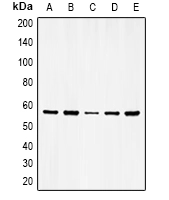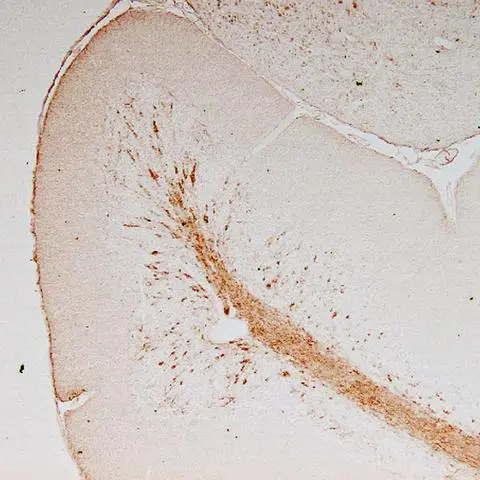
WB analysis of UV-treated MCF7 (A), A10 (B), KNRK (C), UV-treated NIH3T3 (D), UV-treated H9C2 (E) whole cell lysates using GTX32278 Vimentin (phospho Ser56) antibody.
Vimentin (phospho Ser56) antibody
GTX32278
ApplicationsWestern Blot
Product group Antibodies
TargetVIM
Overview
- SupplierGeneTex
- Product NameVimentin (phospho Ser56) antibody
- Delivery Days Customer9
- Application Supplier NoteWB: 1:500 - 1:1000. *Optimal dilutions/concentrations should be determined by the researcher.Not tested in other applications.
- ApplicationsWestern Blot
- CertificationResearch Use Only
- ClonalityPolyclonal
- ConjugateUnconjugated
- Gene ID7431
- Target nameVIM
- Target descriptionvimentin
- Target synonymsvimentin, epididymis secretory sperm binding protein
- HostRabbit
- IsotypeIgG
- Protein IDP08670
- Protein NameVimentin
- Scientific DescriptionThis gene encodes a type III intermediate filament protein. Intermediate filaments, along with microtubules and actin microfilaments, make up the cytoskeleton. The encoded protein is responsible for maintaining cell shape and integrity of the cytoplasm, and stabilizing cytoskeletal interactions. This protein is involved in neuritogenesis and cholesterol transport and functions as an organizer of a number of other critical proteins involved in cell attachment, migration, and signaling. Bacterial and viral pathogens have been shown to attach to this protein on the host cell surface. Mutations in this gene are associated with congenital cataracts in human patients. [provided by RefSeq, Aug 2017]
- Storage Instruction-20°C or -80°C,2°C to 8°C
- UNSPSC12352203

![FACS analysis of Jurkat cells using GTX17723 Vimentin antibody [VM452]. Black : Blank Grey : Isotype Control Green : Primary antibody](https://www.genetex.com/upload/website/prouct_img/normal/GTX17723/GTX17723_20200115_FACS_1470_w_23060620_227.webp)

![IHC-P analysis of human melanoma tissue using GTX80814 Vimentin antibody [J144]. Left : Primary antibody Right : Negative control without primary antibody Antigen retrieval : heat induced antigen retrieval was performed using 10mM sodium citrate (pH6.0) buffer, microwaved for 8-15 minutes Dilution : 1:1000](https://www.genetex.com/upload/website/prouct_img/normal/GTX80814/GTX80814_1419_IHC-P_w_23061322_923.webp)
![IHC-P analysis of human lung carcinoma tissue using GTX83095 Vimentin antibody [4F2E9].](https://www.genetex.com/upload/website/prouct_img/normal/GTX83095/GTX83095_20170912_IHC-P_w_23061322_341.webp)